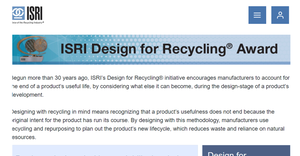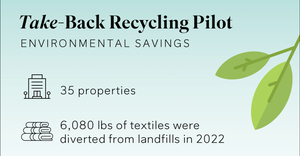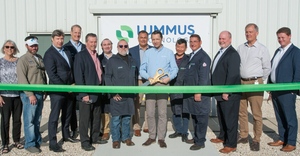Republic Services' growth over the past decade has placed it at the center of a merger-and-acquisition battle among the industry's giants.
August 1, 2008
Michael Fickes
In Late June, Fort Lauderdale, Fla.-based Republic Services, the third-largest hauling firm in the country, made major headlines when it reached an agreement to purchase Phoenix-based Allied Waste Industries, the nation's second-largest hauler.
According to the terms of the all-stock deal, Allied stockholders would receive 0.45 Republic shares for each Allied share they own. The combined company would be called Republic Services and be headquartered in Phoenix. Its annual revenues would exceed $9 billion and have a market capitalization of approximately $12 billion.
Officials from both companies praised the deal — which, pending customary shareholder and regulatory approval, could close in the fourth quarter of this year — and began the arduous task of planning the integration.
However, Republic's summer was only beginning. Suddenly, in addition to planning its marriage with Allied, the firm found itself fending off the feverish advances of the richest kid in town.
Apparently none too thrilled about the prospect of its two biggest rivals joining forces, Houston-based Waste Management, the industry's largest hauling firm with more than $13 billion in revenue in 2007, made an unsolicited, all-cash offer in July to buy Republic and derail the merger. In making the offer, Waste Management CEO David Steiner released a statement saying that his company's $34-per-share offer would provide “a better and more certain value alternative to Republic stockholders” than the Allied deal.
Republic rejected the offer four days later and reaffirmed its commitment to the Allied deal. In his notification letter to Steiner, James O'Connor, Republic's chairman and CEO, claimed that Waste Management's proposal “seriously” undervalued his firm and added that the offer would “deny Republic stockholders the opportunity provided by the merger between Republic and Allied.” He also wrote that a Republic-Waste Management combination would raise regulatory concerns.
Refusing to take no for an answer, Waste Management quickly laid the groundwork for a hostile takeover attempt by filing for federal approval to acquire a more than 1 percent stake in Republic. Such requests initiate antitrust investigations by the U.S. Justice Department.
In a late July conference call to discuss his firm's second-quarter financial results, Steiner noted that his firm is preparing a response to Republic's rejection letter and said Waste Management still is “looking to do a transaction with the cooperation of Republic.” He also would not rule out a possible hostile takeover attempt of Republic.
To protect against such a takeover attempt by Waste Management, Republic recently adopted a “poison pill” plan. Also called a stockholder rights plan, the poison pill would penalize anyone who acquired more than 10 percent of Republic common stock (for entities already holding more than 10 percent, the threshold would be 20 percent) without the firm's approval.
The goal of a poison pill is to make an unwelcome potential acquirer call off a takeover attempt. Republic hasn't specified its penalty. Among the various techniques, though, the takeover target might allow existing shareholders — but not the potential acquirer — to buy more shares at a discount and therefore dilute the shares held by the firm attempting the takeover. The takeover attempt in turn is made more expensive.
That's where the situation stood as Waste Age went to press. [For the most up-to-date coverage of this story, visit www.wasteage.com.]
So, what makes Republic an appealing potential partner?
Solid Foundation
“Republic is an investment grade company,” says Leone T. Young, a research analyst who follows the waste industry for Citi, a New York-based financial services company. “Of the three major waste companies, Republic has the strongest balance sheet. It has the lowest debt-to-capital ratio in the industry.”
Either a Republic-Allied or a Republic-Waste Management combination would probably produce value for shareholders, Young says. “In our preliminary analysis, we estimated that the Allied-Republic merger would be accretive between 10 to 15 cents per share without synergies,” she says. “Synergies would add another 15 cents per share.”
“Synergy” refers to cost savings that the combined companies would generate. Young's analysis found that a combined Republic and Allied would see annual operating costs decline by about $100 million. The savings less taxes would flow directly to the bottom line.
“If Waste Management were to acquire Republic, our preliminary analysis indicated that accretion would total approximately 25 to 30 cents,” Young says.
Another way of looking at the combinations is to note that the effect of the lower operating costs would be to increase cash flow, which presumably would raise the stock price. “With increased cash flow, we have the ability to raise dividends and pay down debt,” says Tod Holmes, Republic's chief financial officer.
It is important to note that while Young's analysis projects $100 million in cost savings in the first year after either potential transaction, Republic's projections, calculated only for the merger with Allied, project $150 million in synergies by the third year of combined operations. Waste Management, meanwhile, estimates that a merger with Republic also would ultimately produce $150 million in annual operational savings.
Republic has earned the respect of the broader business community by refusing to chase revenues at the expense of profits. The Allied-Republic merger makes sense to Republic and Allied because of the powerful effect the firms say the combination will have on profits and on shareholder value.
“The value proposition of an Allied-Republic merger does not exist any place else,” Holmes says. “Think of it this way, the combined entity will be worth about 8.5 times EBITDA.”
“EBITDA” stands for earnings before interest, taxes, depreciation and amortization. It is a measure of cash produced by a company's operations. The Republic-Allied merger would add about $150 million in synergies or cash freed up through cost reductions to EBITDA and raise the value of the merged company by about $1.3 billion (8.5 multiplied by $150 million), Holmes says.
In addition to the potential benefits that either merger would have for shareholders, other waste services may benefit from asset divestitures that could be ordered as part of antitrust investigations by the U.S. Justice Department. An article by the mergermarket news service that appears on the Financial Times' Web site (www.FT.com) in late July notes that firms such as Folson, Calif.-based Waste Connections; Lombard, Ill.-based Veolia Environmental Services; Raleigh, N.C.-based Waste Industries and Toronto-based BFI Canada are some of the larger waste firms that may be interested in buying divested assets.
Building the Giant
This summer's events come as Republic Services celebrates the 10th anniversary of its Initial Public Offering (IPO). The company's journey to its current position began in earnest in the mid-1990s, when Whit Hudson persuaded Wayne Huizenga to join Republic Waste Industries. Both men had helped build the original Waste Management during the 1970s and 1980s. Huizenga had been out of the business for several years building the Blockbuster video rental business. Hudson convinced Huizenga to give the waste industry another try, and Huizenga invested $40 million in the fledgling undertaking while bringing in other investors who put up another $80 million. The company was renamed Republic Industries.
Huizenga and Hudson set a strategy that targeted waste firms in Sunbelt communities for acquisition. The idea was that such companies would grow right along with the growing Sunbelt population. The strategy proved effective, and Republic's revenue from solid waste operations grew from $100 million in 1995 to $1.1 billion two years later.
In 1998, Republic Industries, which had grown to also include car sales and rental businesses, changed its name to AutoNation and separated its solid waste business, naming it Republic Services. That same year, Republic Services went public, and James O'Connor, who had been an executive with Waste Management, joined Republic as its CEO.
O'Connor had several qualities that Huizenga wanted. First of all, O'Connor had been through the acquisition wars with Waste Management and knew that side of the business. He also had extensive experience in operations and had integrated acquisitions, installed efficient management systems and produced internal growth.
O'Connor's assignment was to manage Republic's strategic shift from growth through acquisitions to growth through operations along with a few targeted, strategic acquisitions. By the middle of 2002, Huizenga, O'Connor and Republic's executive team had doubled the size of the company to $2.26 billion.
At that point, the entire industry was consolidating, but O'Connor had begun pulling back on Republic's reins. “Our national competitors still believed that the roll-up side was part of growth,” he says. “Our position was different: We would participate in strategic acquisitions, but we would not chase top-line revenue growth at the expense of the bottom line.”
Now, growth would come primarily from high-quality, efficient operations capable of attracting new customers.
O'Connor's task must have looked daunting. In 1999, Republic Services was a rolled-up collection of small, medium and large companies, each of which had its own way of doing business. “It was all about assimilating all of these companies and all of their cultures into one new culture,” O'Connor says. “The first step was to find the best people and make sure they understood both the process of business planning and execution. The people we brought in had a track record in both.”
O'Connor hired three regional vice presidents, including Michael J. Cordesman, who has since moved up to the posts of president and chief operating officer (COO). O'Connor also set priorities for managers in the field. First came cost control — making sure that local offices provided the least expensive service in the area. That involved optimizing collection and disposal routes, creating maintenance routines, setting up safety programs and implementing training.
“We stayed with all of these things until the routine was institutionalized, part of our culture,” O'Connor says. “We held regional meetings with everyone from the divisional offices. We focused only on costs, safety and training year in and year out, with no new initiatives.”
After controlling costs, it became possible to reset prices to reflect costs and tie future price increases to the Consumer Price Index with an additional 100 to 150 basis points.
Next, O'Connor standardized the technical tools used throughout the company's divisions. Among these technologies is a pricing tool that factors return on investment into pricing. A customer relationship management system automates sales prospecting for the sales staffs, and the maintenance staffs use an advanced maintenance management and tracking tool called Dossier.
“After a while, we all began to pull together in the same direction,” O'Connor says. “The key was that the people in the field started to feel like they owned the routines. When that happened, they started to make things work.”
By the mid-2000s, Republic was growing steadily by marketing the company's capabilities and competitive prices, along with the occasional strategic tuck-in acquisition. Republic executives credit both the original Sunbelt acquisition strategy that acquired companies in growing regions and the integration strategy implemented between 1999 and 2003 for the pace of internal growth. By 2007, Republic was generating annual revenues of $3.2 billion, about $1 billion more than 2002.
By 2006, the business world beyond the waste industry had begun to recognize Republic as a well-run company. In that year, Forbes named Republic to its Platinum 400 list of the best big companies in America, and Institutional Investor magazine named O'Connor one of the Best CEOs in America.
In 2006 and 2007, Institutional Investor named Republic the Most Shareholder Friendly Company in the environmental services industry. In 2008, Republic earned another spot on Forbes' Platinum 400 list, and Institutional Investor placed O'Connor on its Best CEOs in America ranking for the fourth consecutive year. The magazine also named Republic's Tod Holmes one of the best CFOs in the country for the fifth time.
Planning to Join Allied
Despite the maneuverings of Waste Management, Republic is pressing ahead with its plan to merge with Allied.
The history of mergers suggests the two firms have a challenging task in front of them. According to a KPMG study of hundreds of mergers, about 17 percent worked well enough to create value for shareholders. More than 50 percent produced a merged company worth less than the two original firms. Over the years, other studies have reported similar findings.
“Mergers fail because people think that the hard part is making the deal,” says Will Flower, vice president of communications for Republic. “It isn't. The hard part is the integration.”
Integration is a daunting job. It involves merging all of the procedures and policies that companies have developed over the years to manage operations, maintenance, sales, human resources, payroll benefits, retirement plans and the like. In this case, each of these companies has hundreds of locations applying all of these procedures and policies to collection, disposal and recycling activities.
In July, Republic and Allied announced that they had assembled a team of “functional experts” and executives from each company to plan the integration. The two firms also have retained Deloitte Consulting to advise them on integration planning.
The firms say the guiding principle will be to work out a merger of equals. To communicate that to everyone from the start, the companies decided that the combined entity would take Republic's name and have its headquarters in Phoenix. If the deal goes through, O'Connor will become chairman and CEO of the combined company, while Don Slager, Allied's president and COO, will assume the same titles with the new firm.
The basic goal of the integration team will be to select the people, systems and procedures that will enable the combined company to realize $150 million in operational savings by the end of the third year, says Mike Cordesman, Republic's president and COO, who is leading the integration process along with Christopher Melocik, senior vice president of operations effectiveness for Allied.
Discussing the task ahead of them, Cordesman quips, “How do you eat an elephant? One bite at a time.”
Seventeen teams, with representatives from each company on each team, will do the heavy lifting. Each team will manage a function, such as communications, maintenance, operations, sales, benefits, payroll and employment policies.
“The good news is that our two companies are much more alike than we are different,” Cordesman says. “Take the area of safety. There won't be any question about persuading Republic or Allied employees to work more safely. We both have good plans built on the same philosophy.”
While moving forward on its planned merger with Allied, Republic still has to contend with the pursuit of Waste Management, which as of press time had yet to unveil its response to Republic's July rejection. Will the industry's largest player present a more appealing offer to Republic? Or, will Republic find itself in the midst of a hostile takeover attempt?
The months ahead promise to be very interesting indeed.
Michael Fickes is a Westminster, Md.-based contributing writer.
REPUBLIC SERVICES TIMELINE
July 1, 1998 - Republic Services begins trading on the New York Stock Exchange under the symbol “RSG.” Later that year, James O'Connor is named CEO of the firm. Company records $1.4 billion in revenue.
Early 2000s - Republic becomes the third-largest company in the U.S. solid waste market.
2001 - Republic launches company-wide safety initiative.
2003 - O'Connor also becomes chairman of Republic's board, replacing Wayne Huizenga.
2006 - Republic records $3 billion in annual revenue for the first time.
June 23, 2008 - Republic and Allied Waste Services strike merger agreement.
July 14, 2008 - Waste Management makes unsolicited, all-cash offer for Republic in hopes of derailing Republic-Allied merger. Four days later, Republic rejects the offer and reaffirms its commitment to the Allied deal. Waste Management subsequently continues to pursue a purchase of Republic.
Sources: Republic Services and Waste Age.
THE BIG THREE AT A GLANCE
Waste Management
Headquarters: Houston
2007 Revenue: $13.31 billion
Ranking in the 2008 Waste Age 100 listing of the largest solid waste firms (based on revenue): 1
Operations: 354 collection companies, 161 transfer stations, 277 landfills and 105 recycling facilities.
Employees: 47,000
Allied Waste Services
Headquarters: Phoenix
2007 Revenue: $6.07 billion
Ranking in the 2008 Waste Age 100: 2
Operations: 291 collection companies, 161 transfer stations, 161 landfills and 53 recycling facilities.
Employees: 22,300
Republic Services
Headquarters: Fort Lauderdale, Fla.
2007 Revenue: $3.18 billion
Ranking in the 2008 Waste Age 100: 3
Operations: 136 collection companies, 94 transfer stations, 58 landfills and 33 recycling facilities.
Employees: 13,000
Source: Company Web sites and annual reports.
THE TERMS
Under the Republic-Allied merger agreement, Allied shareholders would receive 0.45 shares of Republic common stock for each share of Allied common stock held. Based on the unaffected closing stock prices of both companies on June 12, 2008, the offer represented a premium of approximately 17 percent over the average closing price of Allied's stock for the previous month. In all, Republic would issue 198 million shares of common stock to Allied shareholders, representing approximately 52 percent ownership of the combined company.
The combined company would be called Republic Services and would be headquartered in Phoenix. James O'Connor, Republic's chairman and CEO, would have the same titles with the combined company. Don Slager, president and COO of Allied, would assume the same positions with the new company, and Tod Holmes, Republic's CFO, would have the same title as well. The deal could close in the fourth quarter.
Houston-based Waste Management's unsolicited July offer to buy Republic was relatively straightforward: all cash, $34 per share. Waste Management noted that the proposal represented a premium of roughly 22 percent over the closing price of Republic stock. Republic rejected the offer, saying that the proposal “seriously undervalued” the firm. Waste Management is continuing to pursue an acquisition of Republic.
For the most up-to-date coverage of the Republic-Allied-Waste Management story, visit www.wasteage.com.
You May Also Like


